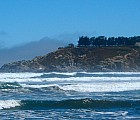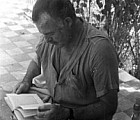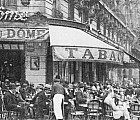Learning more about Alice Hunt Sokoloff: A conversation with her son Kiril


Those of us who are interested in Hadley’s life and her perspective of Hemingway in the early years owe a great deal to Alice Sokoloff. Alice was not only a biographer to Hadley, but also a treasured friend in the last fifteen years of her life. It is not surprising that Alice Sokoloff and Hadley Mowrer found friendship in each other; these two extraordinary women had many things in common. Both were well read and well traveled, both studied and played the piano, both women had one son whom they clearly adored, both were married to prominent men, and both knew some of the most innovative people of their generation. Hadley and Alice clearly enjoyed each other, and that is one of the pleasures of listening to their conversation.
Although Alice has specific purpose in her interviews with Hadley, there is charm and candor in the many distractions throughout the tapes. Alice and Hadley take breaks to play piano, look at photographs, play a hand of cards, and drink sherry. At times, Hadley is effervescent and witty, other times she is tired and forgetful – she was, after all, 80 years old. But Alice handles all the transitions beautifully, including, and especially, the transition between biographer and friend. In fact, Alice often seems to be helping Hadley put her own life in order, to view it in a new way and make some conclusions about it. There is tenderness in their conversation, compassion and humor between these two bright women who’ve lived full lives, talking for hours on winter afternoons.
Alice’s insight and research are remarkable. As she asks Hadley questions, she refers to timelines and notes to clarify dates and facts. Using Carolos Baker’s biography and notes as a reference point, she often departs from Baker’s view of Hemingway as she finds her own narrative. As Hadley’s friend, and certainly as an experienced biographer, it is Alice who sees the ‘arc’ in the story of Hadley’s life. She is fascinated by Hadley’s transformation from a life of isolation to her “leap into life” as Alice calls it, when she and Ernest were young and transformed by their new life in Paris. Alice brings Hadley back to this point again and again, seeing the story within the facts.
Alice was the first person to understand that Hadley’s story was worth preserving, her perspective priceless. She is a sympathetic listener, fully engaged in Hadley’s recollections, responding with uncommon attention whether the moment holds humor, revelation or sorrow. As I have said in previous posts, Alice has a stunning vocabulary, with which she often summarizes what Hadley is saying. Without Alice Sokoloff’s foresight and skillful conversation, we would know considerably less about the five year marriage between Ernest and Hadley and the remarkable way they lived those years.
I have wanted to know more about Alice Sokoloff for a while now and found very little information about her online. Although my hours of research have been focused on Hadley, I have come to admire Alice tremendously; her diplomacy, her intelligence, and above all, her sensitivity. I have recently spoken with and corresponded with Alice’s son, Kiril Sokoloff and learned a little bit more about her. Kiril has kindly shared stories and information with me about his extraordinary mother.
 A photo of Alice Sokoloff taken in 2005 when her son Kiril sponsored the Dalai Lama’s visit to Sun Valley Idaho in September of that year.
A photo of Alice Sokoloff taken in 2005 when her son Kiril sponsored the Dalai Lama’s visit to Sun Valley Idaho in September of that year.
At the time of the interviews with Hadley, (1971 and 1972), Alice was 59 years old. She had written two previous biographies, Cosima Wagner, Extraordinary daughter of Franz Liszt and Kate Chase for the Defense, both of them about original women who led innovative lives. Kiril says that his mother met Hadley through Hadley’s niece, who was also Alice’s friend. Hadley and Alice were neighbors in New Hampshire, and both spent winters in Lakeland, Florida. When I asked Kiril about Hadley he said that he remembered her as “vivacious” and that she had “wonderful compassion.” What he remembered about Hadley was that “She came to the house often for dinner…I was very young…she was lots of fun, a great companion….” Kiril never met Ernest, but he met Jack when” My mother introduced us…we were very good friends.” He describes Jack as a wonderful man who knew how to be happy, do the things he loved, and laugh.
In correspondence with Kiril, he describes his mother Alice as a “very talented concert pianist…very cultivated…took me to all the museums in Europe…read aloud me to me all the great classics.” Although Kiril was a young adult and not living near his family when she was writing Hadley’s biography, he said that his mother “put a lot of herself into it…but her editor wanted a lot of changes and that hurt her a lot.”
Alice was born in New York in 1912, the daughter of Dr James Ramsay Hunt, a professor of neurology at Columbia University and Alice St John Nolan, legendary for her beauty and intelligence. In interviews about her childhood, Alice describes how much reading was valued in her family and how often her father urged his children to read slowly and absorb and remember what they read. (This is undoubtedly where that great vocabulary comes from!) Her education included learning several languages. She was a wonderful student and entered Radcliffe when she was only 16. Because of the Great Depression, she left college after her first year and eventually studied composition with Rubin Goldmark and Constantin Shvedoff and then with Russian pianist Alexander Siloti, “considered the greatest pianist of his day as well as a student of Franz Liszt.” Because of this, Franz Liszt was very much a presence in her musical education. Alice wrote classical music reviews for 25 years that were syndicated in newspapers.
Alice was married to Boris Sokoloff, who emigrated from Russia and came to the United States at the invitation of the Rockefeller institute in Paris. Boris was a gifting scientist with ideas far ahead of his time. During his career he studied the benefits of bioflavenoids and Vitamin C and spent his life searching for a cure for cancer. When Alice and Boris first met, they spoke in French, a language they had in common. Here is a passage Kiril wrote about his father: ‘My father grew up as a member of the old Russian intelligentsia, who were well known for their idealism.’ His father was “was a member of the All-Russian constituent Assembly during the brief period of democracy after the overthrow of the czar and the coming to power of the Bolsheviks.” Boris spoke three or four languages but wrote all of his 27 books in English, most of which were edited by Alice. They had one son, Kiril.
Alice enjoyed her family, reading, conversation (another thing she credits her parents for) and dogs. Later in life, she worked as a volunteer with cancer patients in Westchester County. As she grew older, she kept her quick wit and sharp mind and seemed to laugh easily and enjoy herself. She lived in Sun Valley near her son Kiril until she died in 2006. She left behind a loving family, several fascinating biographies, and an ideal; a beautiful example of how to live.

Kiril Sokoloff lives in Boca Raton Florida and Sun Valley Idaho and is the founder of 13D Research, Inc, an investment company. He writes the weekly newsletter “What I Learned This Week” and is a popular lecturer around the country. Like his parents, Kiril travels all over the world and conveys a natural sense of leadership and generosity. Some of his lectures can be viewed on youtube.
Late in her life, Alice laughingly said that everyone in her family must write a book, and this has proven to be true. Kiril also published a book in 2005, and was kind enough to send me a copy. Kiril’s book is a memoir titled Personal Transformation: An Executive’s story of Struggle and Spiritual Awakening, which has had wonderful reviews. Here is a synopsis:
“This is the story of a prominent executive who, after becoming a wildly successful investment guru, begins a decline into near-total deafness. His struggle with loss and loneliness, his discovery of joy and transformation, and his immediate writing style make this a classic spiritual book.”
When I asked Kiril if he was influenced by Hemingway, he said: “The family is terrific and I loved them very much.”






Was up in Sonoma Wine Country, Allie, so my responses may be a bit late. Another great post! Great to gain further insight into Hadley and those around her.
What a fascinating post.
Did people live more amazing lives in the last century or is it just that you are good at making it seem that way ?
You, too, Allie (like Alice) seem to have a keen grasp of the ‘arc’ of Hadley’s life, the personal meaning that came out of her life and divorce with Ernest, and how her life was definitely changed (eventually for the better!) through their relationship. Listening to the snippets of audio you’ve posted of Hadley’s and Alice’s discussion, it is easy to tell Alice was a good friend and trusted confidant. Thank you Allie for sharing this with us and making these characters even more personable and interesting!
Amazing people all around!
Enjoyed this post very much. I love to read about women living full lives and pursuing their passions. Alice deserves a biography if she doesn’t have one already. Kiril’s book sounds intriguing. Thanks, Allie, for introducing me to these interesting people.
Hey Allie, yet another great post! Keep up the good work
Allice, what a beautifully written piece on Alice and her son. I love the way she interviewed Hadley, so sensitive to her because Hadley was so humble and unable at times to see how truly amazing her life was and what a quiet impact she made on those around her. You are right, Alice was the perfect person to do the interviews and ask the right questions which has allowed us an inside look at the lovely and intellligent
Hadley. Hadley lived well because she was able always to see the best side in people, even Pauline.. I like that Hadley felt relieved after her marriage to Hemingway ended and her second husband really appreciated and loved her, and the other 3 women suffered greatly while being with an alcoholic and bi-polar man. No matter how great
the writer, the human Hemingway was a difficult partner and I am glad that Hadley was spared that journey and that she knows it.
Thanks for creating this remarkable site. Melissa
p.s. regarding the money Hadley received from the Sun also Rises, I wonder if the publisher would have that information and share it with you?
Melissa,
Thank you for such an insightful comment! It is so easy to love Hadley and her story of triumph – I have learned so much from the way she lived her life, taking risks and yet staying true to who she really was. I will be posting more Hadley audio soon – thanks again for reading and commenting! Allie
PS. I would love to know more about the proceeds from the Sun Also Rises, but have yet to find any information about it.